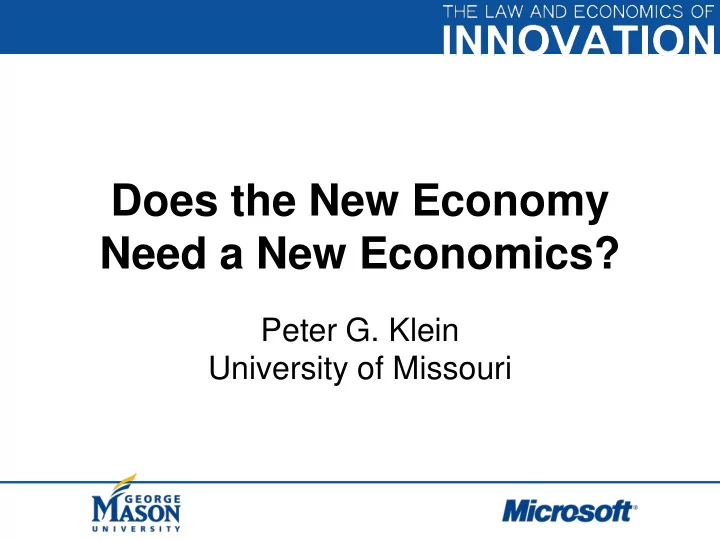

Does the New Economy Need a New Economics? Peter G. Klein University of Missouri
The knowledge-based economy • Growth and importance of networks • Role of intangible assets • Importance of services over manufacturing • Emergence of new organizational forms • Changes in nature of competition
Is regular economics still useful? • Online markets • Information goods • Network effects • Commons-based peer production
The very best gets cheaper each year. This rule of thumb is so ingrained in our contemporary lifestyle that we bank on it without marveling at it. But marvel we should, because this paradox is a major engine of the new economy. . . . Through most of the industrial age, consumers experienced slight improvements in quality for slight increases in price. But the arrival of the microprocessor flipped the price equation. In the information age, consumers quickly came to count on drastically superior quality for less price over time. The price and quality curves diverge so dramatically that it sometimes seems as if the better something is, the cheaper it will cost. — Kevin Kelly, New Rules for the New Economy, 1998
Scarcity, the first assumption of the old economy, isn’t the dominant feature of the New Economy. Many of today’s markets are awash with goods and services. Sellers compete aggressively for buyers. They discount. They cut costs. They expand markets through relentless promotion and advertising. Increasing returns to scale pervade the New Economy. More of today’s companies and industries thrive on quantity discounts — the higher the demand, the lower the price. Decreasing returns to scale dominated the old economy, so producing more goods and services pushed prices up. — Federal Reserve Bank of Dallas Annual Report, 1999
Billions of connected individuals can now actively participate in innovation, wealth creation, and social development in ways we once only dreamed of. And when these masses of people collaborate they collectively can advance the arts, culture, science, education, government, and the economy in surprising but ultimately profitable ways. Companies that engage with these exploding Web-enabled communities are already discovering the true dividends of collective capability and genius. To succeed, it will not be sufficient to simply intensify existing management strategies. Leaders must think differently about how to compete and be profitable, and embrace a new art and science of collaboration we call wikinomics. — Tapscott and Williams, Wikinomics, 2008
Question #1: How new is new? New Economy Old Economy Web pages, blogs, tweets Pamphlets Internet Telegraph Online directories Phone book Personal computers Electricity, automobiles, refrigerators, washing machines, telephones, VCRs Commons-based peer Markets production
What about information goods? • Information is a consumer good (evaluated, subjectively, like other consumer goods). • Information goods aren’t new. • The production process for information (high fixed cost, low marginal cost), implies specific investment and pricing strategies. • Price discrimination • Two-part pricing (often with free giveaways to increase installed base) • Increasing returns and incumbent advantages
And network effects? • Network effects, path dependence, and lock-in: a new source of ―market failure‖? • Examples: QWERTY, VHS, MS-DOS, A/C power, internal-combustion engine • Some problems • Imperfect knowledge • The political process • Are there any real-world examples? (Liebowitz and Margolis)
Is e-commerce different from regular commerce? • Downward pressure on prices (as standard theory predicts) • Increase in number of sellers • Reduction in buyer search and transaction costs • Substantial price dispersion (Baye, Morgan, and Scholten, 2006) – no ―hypercompetition‖ • Much prior evidence from studies of financial markets, auctions (but now, better data!)
IT and productivity • Adoption of IT: rapid but not unprecedented • Large literature on diffusion of innovation • IT typically combined with complementary workplace practices (decentralization of decision rights, performance-based pay, teams) (Milgrom and Roberts, 1995; Ichniowski, Shaw, and Prennushi, 1997; Breshnahan, Brynjolfsson, and Hitt, 2002) • Effects of IT adoption on productivity: difficult to measure, particularly in services, but possible using ―standard‖ techniques (Athey and Stern 1999, 2002)
A new theory of the firm? • The knowledge economy • Increasingly valuable knowledge (e.g., intangible capital) that is increasingly dispersed (Hayek) • Shorter product cycles, modularity, rapid diffusion • The wikified firm • Flatter hierarchies with strong delegation and incentives • Employee ownership of assets (including knowledge) • The wikified economy • Outsourcing • Networks • Blurry boundaries
Problems with the “wikinomics” view • Little systematic empirical evidence • Underdeveloped understanding of authority • Type I authority: principal commands a specific ex post action • Type II authority: principal delegates discretion • Bottom line: death of corporate hierarchies greatly exaggerated
Takeaways • Information technology, intellectual property, peer production, etc. do have interesting and unusual economic characteristics. • Information goods and network effects are important (though not really new). • The laws of economics still apply!
Recommend
More recommend